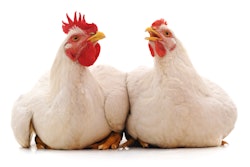
Poultry processing needs regular monitoring to ensure that work is carried out as it should be and that targets are met.
This responsibility falls to three professions – supervisors, consultants and auditors – who need to focus their attention on ensuring that processed birds meet quality, safety and yield requirements and that costs are no higher than they should be.
Determining the role of each profession and identifying where professionals may fail to fully deliver what they are paid to do can help to ensure that the maximum is obtained from the work.
Supervisors
To be fully productive, supervisors need to understand all of the mental maps for the sections under their responsibility. They must have proven practical experience and a strong ability to communicate with workers so any issues can be corrected as quickly as possible.
Amongst their daily challenges, they are to look for improvements in the following areas:
- Ergonomics
- Working practice
- Worker safety
- Staff motivations to ensure that tasks are properly carried out
- Fostering a convivial working atmosphere, while ensuring that tasks are not neglected
- Encouraging learning
- Developing new ideas
- Ensuring that water, energy and other resources are not wasted
What can go wrong
When supervisors do not have thorough knowledge of the birds being processed, it can be a case of the eyes not seeing what the mind does not know.
Additionally, if they are uncomfortable in the presence of, for example, blood, feathers or offal, they will adopt the attitude of being a virtual spectator. Consequently, they are unable to form a proper opinion of the birds that arrive at the plant to be processed. This can lead to their understanding of dry yields being only partial.
Working directly on the processing line would offer supervisors valuable experience, however, the reality is that this experience is too often lacking. Too many supervisors prefer to monitor from a distance, requesting that product is removed from the line and examined in a more comfortable environment, with some asking for it to be brought to their office. In some extreme cases, this monitoring is done simply using photographs.

This lack of direct supervision can have an enormous impact on the economic performance of the plant and lead to quality problems, low yields, increased expenditure and line workers losing motivation.
Consultants
Consultants are characterized by having a deep knowledge of the raw materials processed in the plant and have broad operational experience. This should allow them to propose simple and practical solutions to any problems that may exist during processing.
The success of their work depends upon how they relate to all of the employees at the plant, from operational to management, maintenance to marketing. They must be natural leaders.
Their visits should awaken a sense of professional curiosity amongst those they work with. They should bring new knowledge to the plant and new ideas for problem solving, and this should result in increased productivity.

What can go wrong?
Consultants are hired to come up with new ideas and effective solutions that offer quick results in the areas of quality, safety and yield. Too often, however, this does not happen, and this is often due to a number of factors being overlooked.
Consultants must remember that every plant is different. While consultants may be deeply knowledgeable, it is the workforce that handles birds on a daily basis that fully understands what is going on within the plant and should never be ignored.
The success of a consultant often depends on quickly understanding what is happening in a plant. Adding this newly acquired information to what is already known should result in effective solutions being offered, either partially or fully, should circumstances permit. Involving the plant personnel is fundamental to achieving this.
Auditors
Auditors are generally experts in data analysis, due to their accounting training. Additionally, they have a basic understanding of broiler anatomy and physiology and have had the opportunity to work in processing plants. During their periodic visits they detect operational situations that may prevent goals being met.
What can go wrong?
Auditors can also be guilty of ignoring the value and store of knowledge within the workforce.
A failure by these professionals results in a costly waste of time, whereas when they perform well, the benefits they bring are far greater.
Key focus areas for poultry processing
www.WATTAgNet.com/articles/44137
















